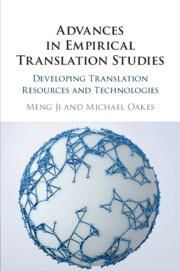Book contents
- Advances in Empirical Translation Studies
- Advances in Empirical Translation Studies
- Copyright page
- Contents
- Figures
- Tables
- Contributors
- Preface
- 1 Advances in Empirical Translation Studies
- 2 Development of Empirical Multilingual Analytical Instruments
- 3 Statistics for Corpus-Based and Corpus-Driven Approaches to Empirical Translation Studies
- 4 The Evolving Treatment of Semantics in Machine Translation
- 5 Translating and Disseminating World Health Organization Drinking-Water-Quality Guidelines in Japan
- 6 Developing Multilingual Automatic Semantic Annotation Systems
- 7 Leveraging Large Corpora for Translation Using Sketch Engine
- 8 Developing Computerised Health Translation Readability Evaluation Tools
- 9 Reordering Techniques in Japanese and English Machine Translation
- 10 Audiovisual Translation in Mercurial Mediascapes
- 11 Exploiting Data-Driven Hybrid Approaches to Translation in the EXPERT Project
- 12 Advances in Speech-to-Speech Translation Technologies
- 13 Challenges and Opportunities of Empirical Translation Studies
- Index
- References
13 - Challenges and Opportunities of Empirical Translation Studies
Published online by Cambridge University Press: 10 June 2019
- Advances in Empirical Translation Studies
- Advances in Empirical Translation Studies
- Copyright page
- Contents
- Figures
- Tables
- Contributors
- Preface
- 1 Advances in Empirical Translation Studies
- 2 Development of Empirical Multilingual Analytical Instruments
- 3 Statistics for Corpus-Based and Corpus-Driven Approaches to Empirical Translation Studies
- 4 The Evolving Treatment of Semantics in Machine Translation
- 5 Translating and Disseminating World Health Organization Drinking-Water-Quality Guidelines in Japan
- 6 Developing Multilingual Automatic Semantic Annotation Systems
- 7 Leveraging Large Corpora for Translation Using Sketch Engine
- 8 Developing Computerised Health Translation Readability Evaluation Tools
- 9 Reordering Techniques in Japanese and English Machine Translation
- 10 Audiovisual Translation in Mercurial Mediascapes
- 11 Exploiting Data-Driven Hybrid Approaches to Translation in the EXPERT Project
- 12 Advances in Speech-to-Speech Translation Technologies
- 13 Challenges and Opportunities of Empirical Translation Studies
- Index
- References
Summary
This chapter raises and addresses the key question of the relation between empirical translation studies and the descriptive branch of pure translation research initially proposed in the late 1980s. It analyses, explains, and illustrates the rationale and viability of the proposed ‘empirical turn’ in translation studies, which is to better align the central aims and purposes of the discipline with new, practical research needs arisen from our changing social environments in many parts of the world. It is argued in the conclusion that as demonstrated by the diverse chapters in the book, translation studies, especially the descriptive, empirical research branch has benefited and will continue to benefit from the integration of advanced quantitative research methodologies and advances in corpus analytical software development and natural language processing technologies such as machine translation. This bourgeoning translation research field is thus well equipped to play a larger, more significant role in addressing practical, pressing social and research issues such as environment communication, sustainable development and health literacy which is proposed as the much-needed ‘social turn’ in empirical translation studies.
Keywords
- Type
- Chapter
- Information
- Advances in Empirical Translation StudiesDeveloping Translation Resources and Technologies, pp. 252 - 264Publisher: Cambridge University PressPrint publication year: 2019
References
- 4
- Cited by

